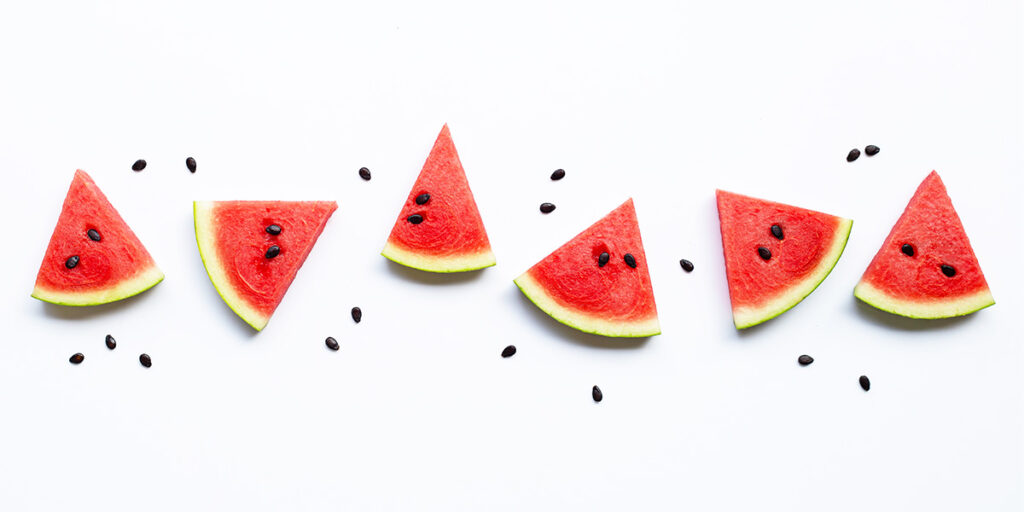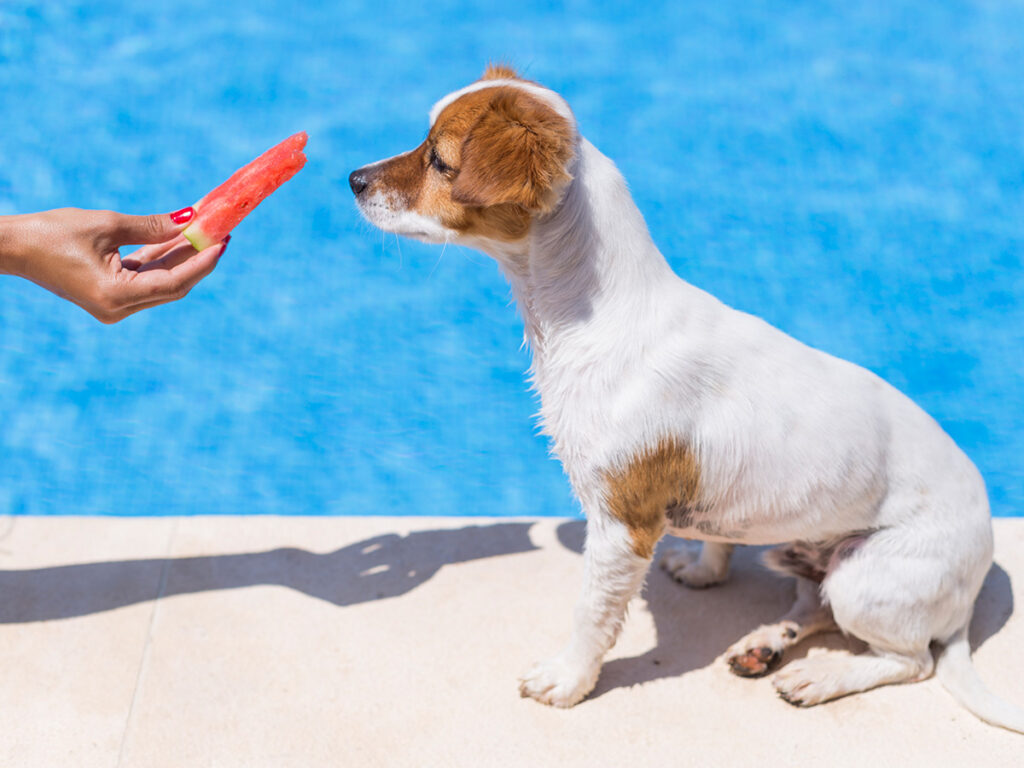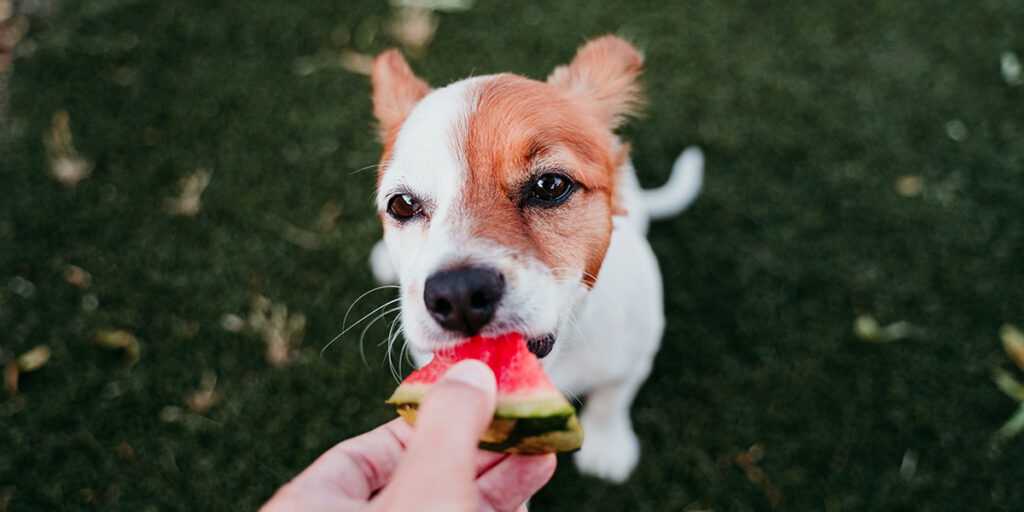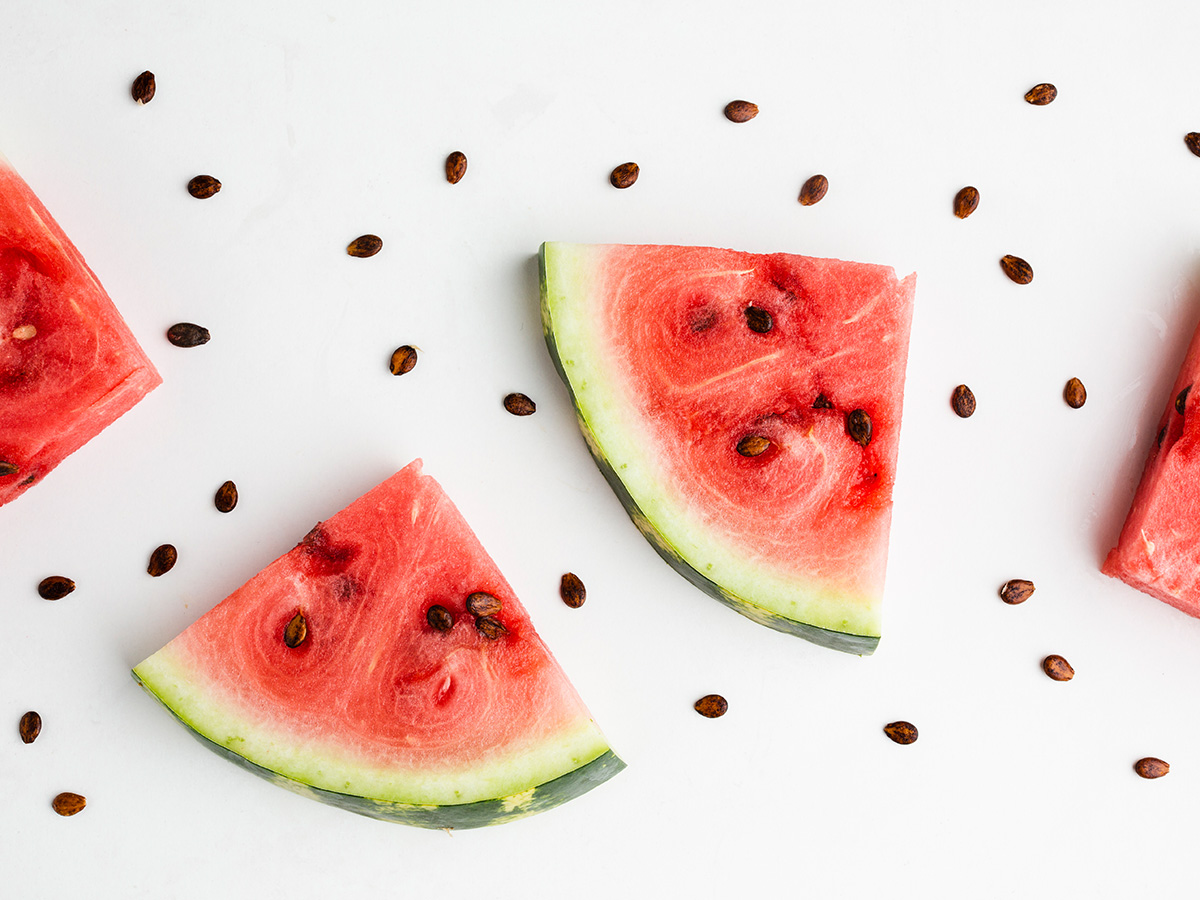As soon as we sense that hotter weather is coming and summer is right around the block, we start craving all types of fruits and vegetables. The days get longer, and we spend more time with our dogs outside.
Naturally, we share some of our food with our pup! However, sometimes we are not entirely sure whether some foods are equally healthy for dogs as they are for us.
The main topic for today is simple – can dogs eat watermelon?
In the following post, we will reveal some important information that you certainly didn’t know about dogs and watermelons!
Let’s get into it right away!
Table of Contents
What Makes a Watermelon Healthy?
Would you agree that you don’t know a person who doesn’t like watermelon?
The first thing that comes to our mind when we say watermelon is a juicy fruit full of water. We are fairly certain that it is as tasty as anything!
In contrast, we are not aware of how healthy it can be for us and our dog. Important ingredients that confirm its healthy properties are many vitamins such as:
- Vitamin C
- Vitamin A
- Vitamin B6

What are the benefits of increasing the intake of these particular vitamins?
To start off, let’s simply say that watermelon is rich in antioxidants. Feel free to imagine an antioxidant as a means of preventing a drop in immunity.
For example, vitamin C is extremely rich in antioxidants. It can help prevent inflammation and is an excellent remedy for allergic reactions. Just one cup of watermelon contains 20 percent of the daily intake of vitamin C!
Furthermore, vitamin A intake will have a positive effect on eyesight. It will maintain night vision abilities. In addition to all of the above, Vitamin A will contribute to your dog’s reproductive health.
The third main ingredient in watermelon is vitamin B6. It improves the function of our nervous system and metabolism. This means that your dog will be more resistant to the development of possible diseases.
Watermelon is also a rich source of fiber. The fibers found in watermelon can help digestion and prevent constipation.
Watermelon is known to contain a small amount of sugar. With the help of fiber, sugar will enter the bloodstream more slowly. In this way, the dog’s blood sugar level is maintained within the normal range, which is great to hear!
Let’s answer the big question now.
Should a Dog Eat Watermelon?

The answer to this question is simple:
Yes, but under certain conditions.
The dog’s body will not tolerate different parts of the watermelon equally. A bad reaction will occur if the dog eats seeds or the rind. However, you shouldn’t stress over the little things! A couple of seeds won’t make a big deal. Only larger amounts can be harmful and potentially block their intestine.
Watermelon rind is also a problem for the dog’s body. By ingesting the rind, the dog will significantly delay and slow down the digestion process.
Remember: moderation is key!
The Potential Side Effects
The most common symptoms that can occur if a dog eats a larger amount of watermelon are digestive. Diarrhea or vomiting may occur.
Monitor your dog’s behavior for a few hours after eating watermelon. If you notice the manifestation of symptoms, seek the help of a veterinarian.
How to Prepare Watermelon?
To prevent the things we mentioned above:
- Clean the watermelon well.
- Choose an appropriate place to clean the watermelon. It is important that this place isn’t within reach of your dog!
- If your dog is next to you, feeding them with a spoon might be the best choice to monitor how much they eat.
Also, it would help if you were careful when choosing watermelons. Choose a juicy one. There are seedless watermelons, but they contain white seeds. They have the same side effect as black seeds.
Pro Tips: How to Choose the Perfect Watermelon
- Juicy watermelons contain a yellow spot at the bottom. If it is creamy yellow, it is a complete hit.
- Tap the watermelon. If the sound is deep, the watermelon is full of juice. Bingo!
- Rotten watermelons have black spots on the rind. Avoid them if you can. Fresh fruit is the best kind of fruit.
5 Benefits That Watermelon Offers

Moderate amounts of watermelon can contribute to your dog’s well-being (as well as your own). Here are some benefits that your dog will get if watermelon starts appearing on the menu:
#1 – It keeps the body hydrated.
You might be familiar with the fact that more than 90% of watermelon consists of water. By consuming watermelon, the dog satisfies the need for optimal amounts of water.
Water makes up to 80 percent of a dog’s body! According to Cynthia Otto, without a sufficient amount of water, the dog becomes more prone to possible diseases.
#2 – It helps maintain normal heart function.
For a healthy heart, it is necessary to take vitamin C and other antioxidants that we mentioned earlier. In addition to antioxidants, watermelon contains minerals. These are mainly potassium and magnesium, which regulate normal blood pressure.
#3 – It keeps teeth healthy.
In our recent article, we talked about brushing your dog’s teeth. We stated that not brushing a dog’s teeth can cause the spreading of different diseases to vital organs.
While brushing is important, watermelon can help! The antioxidant effect of vitamin C prevents the appearance and development of dental diseases. For better oral hygiene, offer your dog a watermelon!
#4 – It gives support to the muscles.
Watermelon plays an important role in both the development and strengthening of your dog’s muscles. The reason for that is the presence of potassium.
If you meet your dog’s potassium needs, you will notice an improvement in endurance. Your dog will have a greater appetite and will be more energetic.
#5 – It has a protective effect on your dog’s skin.
A dog’s skin is very sensitive to the change of seasons. During the summer, high temperatures can even cause burns to your dog’s skin!
Lycopene has a role in protecting the skin from damage, specifically from UV rays. The red color of the watermelon confirms its presence.
Watermelon Recipes: YES or NO?

You can find a bunch of watermelon recipes on the internet. Sure, most of them are incredibly tasty. However, we should ask ourselves:
Are they good for our dog too?
In most cases, the dog will not tolerate the recipes that we use. The reason is rather logical: we tend to use many artificial sweeteners, which are not good for our dogs. As a result, gastric problems occur.
Various artificial sweeteners can impair a dog’s health in the long run:
- They can lead to increased cholesterol and obesity.
- They also worsen the blood count.
Before you decide on some sweet recipe, it is best to visit your vet and check if it is something good for your dog. In addition to determining cholesterol levels, the veterinarian will offer help with the choice of sweets.
Please pay attention to the recipes you are trying out. Let it be recipes that are based exclusively on the use of natural ingredients. We are certain there are many recipes with a combination of some other fruit that is suitable for your dog.
If you have experience with preparing food for your dog and want to try another recipe, filter the search. You can apply the following mental filters:
- Pick the recipes with the most reviews– It’s simple but effective. Pay special attention to the comments.
- Simple recipes are a priority– Ingesting a bunch of different ingredients at once can make your dog sick, especially if it is small. It will probably be harder to tolerate all these ingredients at once.
- Pick recipes made exclusively for dogs– Don’t search for dessert recipes that people eat. The reason for this is because we can often find a recipe that sounds delicious to us but may be harmful to our pooch.
Conclusion
If given in moderation, watermelon is a completely safe treat! Your dog will simply enjoy it, especially if it is extremely hot outside. Choose a natural recipe and enjoy sharing it with your dog!
I hope you found this article useful and you learned something new.
Now I would like to hear your opinion.
How do you prepare watermelon for your dog? Do you use any particular recipe?
List your favorites in the comments below!
See you in the next post!
